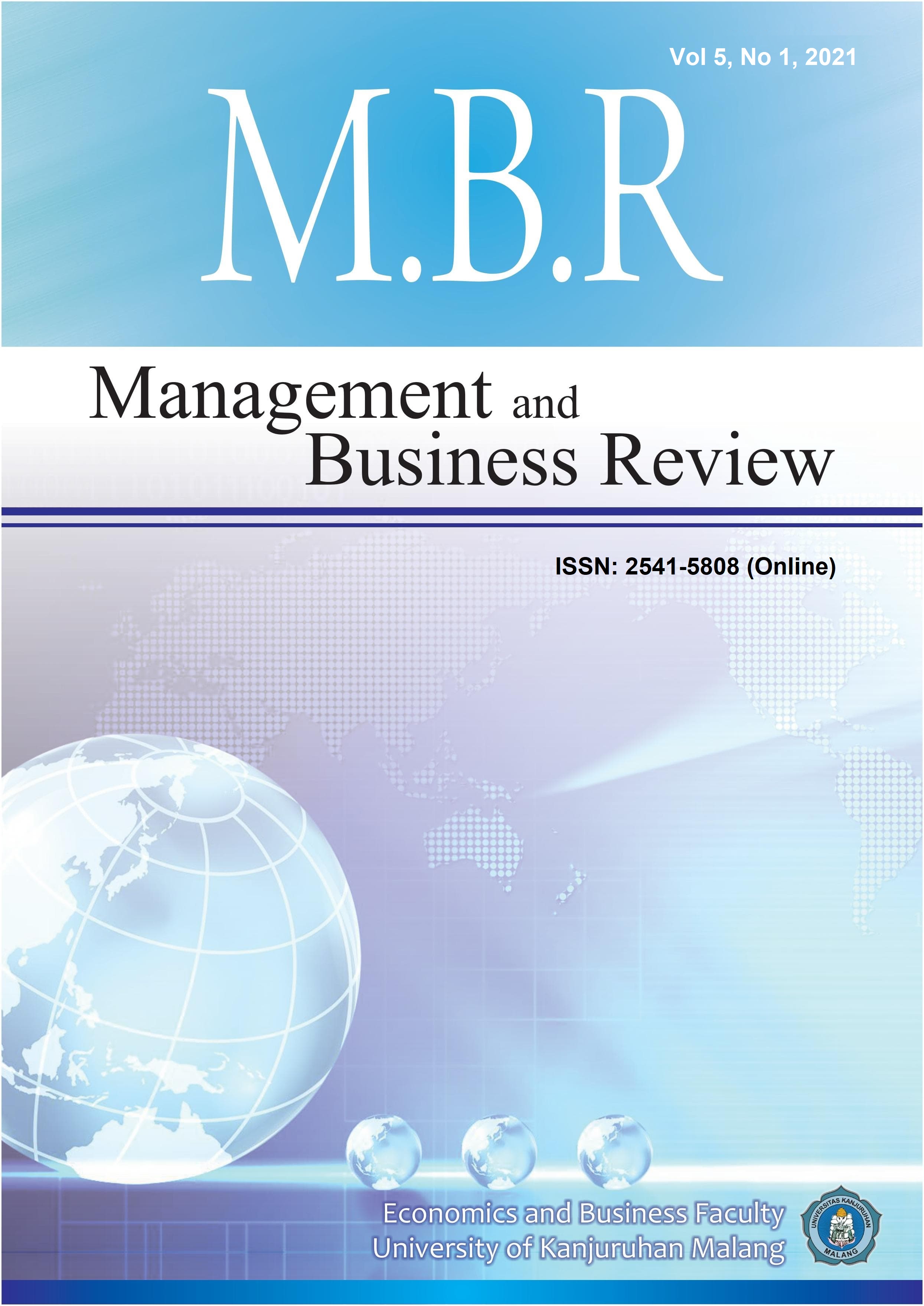Peran Sistem Informasi pada peningkatan efektifitas kerja pegawai
Main Article Content
Abstract
The purpose of the study was to analyze the role of information systems consisting of system quality, information quality, ease of use, and user satisfaction on information systems on the effectiveness of employees' work. The study population was 221 employees at the University of PGRI Kanjuruhan Malang, the number of samples in the study was 69 employees using the proportional random sample technique. The data analysis technique used multiple linear regression analysis. The results showed that the system quality, information quality, ease of use and user satisfaction had an effect on employee work effectiveness. So the information system will simplify and speed up the implementation of the work if the quality of the system is considered, the quality of information, the ease of use, and ensures that users are satisfied. Research is limited to one organization, can be developed by involving broader research
Article Details
References
Ali, B. M., & Younes, B. (2013). The impact of information systems on user performance: an exploratory study. Journal of Knowledge Management, Economics and Information Technology, 3(2), 128–154.
Antasari, K. C., Sukartha, P., & D’yan, P. (2015). Pengaruh efektivitas sistem informasi akuntansi dan penggunaan teknologi informasi pada kinerja individual dengan kepuasan kerja sebagai variabel pemoderasi. E-Jurnal Akuntansi, 10(2), 354–369.
DeLone, W. H., & McLean, E. R. (2003). The DeLone and McLean model of information systems success: a ten-year update. Journal of Management Information Systems, 19(4), 9–30.
Demyanova, O. V, Andreeva, E. V, Sibgatullina, D. R., Kireeva-Karimova, A. M., Gafurova, A. Y., & Zakirova, C. S. (2018). Evaluation of effectiveness of information systems implementation in organization (by example of ERP-systems). Journal of Physics: Conference Series, 1015, 42009. https://doi.org/10.1088/1742-6596/1015/4/042009
Ernawatiningsih, N. P. L., & Kepramareni, P. (2019). Effectiveness of accounting information systems and the affecting factors. International Journal of Applied Business and International Management (IJABIM), 4(2), 33–40.
Ginting, D. B., & Marlina, M. R. (2017). Analisis Pengaruh Kualitas Sistem, Kualitas Layanan, Kualitas Informasi, Kemudahan Penggunaan, dan Persepsi Manfaat Terhadap Kepuasan. Media Informatika, 16(1), 20–31.
Husein, M. F., & Wibowo, A. (2011). Sistem Informasi Manajemen. Yogyakarta: AMP YKPN.
Indralesmana, K. W., & Suaryana, I. G. N. A. (2014). Pengaruh Penerapan Sistem Informasi Akuntansi Terhadap Kinerja Individu Pada Usaha Kecil Dan Menengah Di Nusa Penida. E-Jurnal Akuntansi Universitas Udayana, 8(2014), 14–26.
Ladjamudin, A.-B. Bin. (2012). Analisis dan Desain Sistem Informasi. Yogyakarta: Graha Ilmu.
Machmud, R. (2013). Peranan penerapan sistem informasi manajemen terhadap efektivitas kerja pagawai lembaga pemasyarakatan narkotika (lapastika) Bollangi Kabupaten Gowa. Jurnal Capacity, 9(3), 409–421.
Melasari, R. (2017). Pengaruh Sistem Informasi Akuntansi Terhadap Kinerja Karyawan Dengan Integritas Karyawansebagai Variabel Pemoderasi Pada Perbankan Di Tembilahan. Jurnal Akuntansi Dan Keuangan, 6(1), 1–15.
Nandasari, D. A., & Ramlah, S. T. (2019). Pengaruh Sistem Informasi Akuntansi Terhadap Kinerja Karyawan. Tangible Journal, 4(1), 38–51.
Schermerhorn, J. R., & Bachrach, D. G. (2013). Introduction to Management 12th Edition. Wiley Singapore.
Sarwoko, E. (2018). Analisis Statistik Menggunakan SPSS 22. Media Nusa Creative.
Setyo B, D., & Rahmawati, D. A. (2015). Pengaruh Kualitas Informasi Dan Kualitas Sistem Informasi Terhadap Kepuasan Serta Kinerja Pengguna Sistem Informasi. Efektif : Jurnal Bisnis Dan Ekonomi, 6(1), 47–59.
Setyowati, E. O. T., & Respati, A. D. (2017). Persepsi Kemudahan Penggunaan, Persepsi Manfaat, Computer Self Efficacy, Dan Kepuasan Pengguna Sistem Informasi Akuntansi. Jurnal Riset Akuntansi Dan Keuangan, 13(1), 63–75.
Shagari, S. L., Abdullah, A., & Saat, R. M. (2017). Contributory factors of accounting information systems effectiveness in Nigerian banking sector. Asian Journal of Multidisciplinary Studies, 151.
Siagian, S. P. (2009). Pengembangan Sumber Daya Insani. Jakarta: Gunung Agung.
Tulodo, B. A. R., & Solichin, A. (2019). Analisis Pengaruh Kualitas Sistem, Kualitas Informasi dan Perceived Usefulness terhadap Kepuasan Pengguna Aplikasi Care dalam Upaya Peningkatan Kinerja Karyawan. JRMSI-Jurnal Riset Manajemen Sains Indonesia, 10(1), 25–43.
Tumarni. (2015). Pengaruh Kualitas Sistem, Kualitas Informasi dan Penggunaan Nyata Terhadap Kepuasan Pemakai Laporan keuangan (Studi Pada Satuan kerja Perangkat Daerah Pemerintah Provinsi Jambi). Journal of Chemical Information and Modeling, 53.
Utomo, L. T., Ardianto, Y. T., & Sisharini, N. (2017). Pengaruh kualitas sistem, kualitas informasi, kualitas layanan, terhadap kepuasan pengguna sistem informasi akademik Universitas Merdeka Malang. Jurnal Teknologi Dan Manajemen Informatika, 3(2), 149–160.
Wardiana, W. (2002). Perkembangan Teknologi Informasi di Indonesia. Peneliti Pusat Penelitian Informatika-Lembaga Ilmu Pengetahuan Indonesia.
Widodo, A., Dwi, H. R. D. R., & Nurchayati, N. (2016). Pengaruh Kualitas Sistem Aplikasi Dan Kualitas Informasi Terhadap Kepuasan Pengguna Sistem Aplikasi RTS (Rail Ticketing System) Dengan Kepercayaan Sebagai Variabel Mediasi (Studi Pada Penumpang “KAI†Ekonomi Operasi 4 Semarang). Media Ekonomi Dan Manajemen, 31(2), 160–181.
